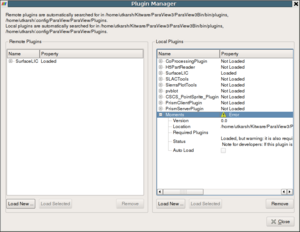ParaView/Users Guide/Loading Plugins
From KitwarePublic
< ParaView
Jump to navigationJump to search
Revision as of 19:57, 17 February 2011 by DaveDemarle (talk | contribs) (restructure so main wiki can link to plugins)
Loading Plugins
There are three ways for loading plugins:
- Using the GUI (Plugin Manager)
- Plugins can be loaded into ParaView using the Plugin Manager accessible from Tools | Manage Plugins/Extensions menu. The Plugin Manager has two sections for loading local plugins and remote plugins (enabled only when connected to a server). To load a plugin on the local as well as remote side, simply browse to the plugin shared library. If the loading is successful, the plugin will appear in the list of loaded plugins. The Plugin manager also lists the paths it searched to load plugins automatically.
- The Plugin Manager remembers all loaded plugins, so next time to load the plugin, simply locate it in the list and click "Load Selected" button.
- You can set up ParaView to automatically load the plugin at startup (in case of client-side plugins) or on connecting to the server (in case of server-side plugins) by checking the "Auto Load" checkbox on a loaded plugin.
- Using environment variable (Auto-loading plugins)
- If one wants ParaView to automatically load a set of plugins on startup, one can use the PV_PLUGIN_PATH environment variable. PV_PLUGIN_PATH can be used to list a set of directories (separated by colon (:) or semi-colon (;)) which ParaView will search on startup to load plugins. This enviromnent variable needs to be set on both the client node to load local plugins as well as the remote server to load remote plugins. Note that plugins in PV_PLUGIN_PATH are always auto-loaded irrespective of the status of the "Auto Load" checkbox in the Plugin Manager.
- Placing the plugins in a recognized location. Recognized locations are:
- A plugins subdirectory beneath the directory containing the paraview client or server executables. This can be a system-wide location if installed as such.
- A Plugins subdirectory in the user's home area. On Unix/Linux/Mac, $HOME/.config/ParaView/ParaView<version>/Plugins. On Windows %APPDATA$\ParaView\ParaView<version>\Plugins.

